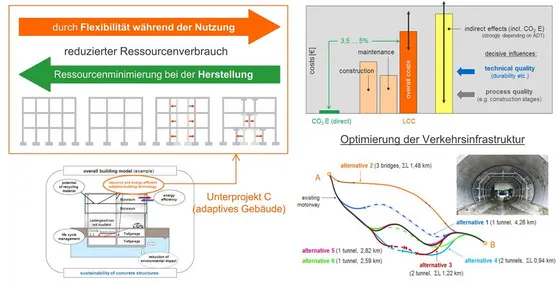
To lay the foundation for the integrated optimization of buildings as well as traffic infrastructure, with regard to sustainability and the related life cycle costs, various research projects have been carried out. Management of bridge maintenance is currently based on the assignment of condition grades (bridge inspection) by individuals and leads to uncorrelated, somewhat subjective evaluations. To increase the quality of the structural assessment, a joint research project was carried out (“Intelligent Bridges”) with the Chair of Computational Modeling and Simulation, where the objective was to further develop the concept of building/bridge inspection in order to describe the relationship between different damage mechanisms as well as their effects on the state of the overall structure based on measured data. Additional research projects were carried out to describe specific load-bearing mechanisms more realistically and to evaluate typical long-term damages (e.g. corrosion due to stress cracks on the basis of a probabilistic approach). Thereby, significant contributions were made to the development of the “verification guidelines” (Nachrechnungsrichtlinie) for the systematic evaluation of the bearing capacity and reliability of existing bridge structures.
